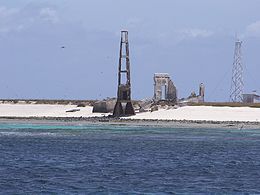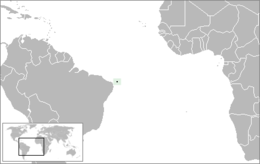 Ruins of the old lighthouse, with the new lighthouse in the background Ruins of the old lighthouse, with the new lighthouse in the background | |
 | |
| Geography | |
|---|---|
| Location | Atlantic Ocean |
| Coordinates | 03°52′S 33°49′W / 3.867°S 33.817°W / -3.867; -33.817 |
| Archipelago | Atol das Rocas |
| Total islands | 2 |
| Major islands | Farol; Cemitério |
| Area | 0.36 km (0.14 sq mi) |
| Administration | |
| Brazil | |
| Region | Northeast |
| State | Rio Grande do Norte |
| Demographics | |
| Population | uninhabited |
| UNESCO World Heritage Site | |
| Official name | Brazilian Atlantic Islands: Fernando de Noronha and Atol das Rocas Reserves |
| Type | Natural |
| Criteria | vii, ix, x |
| Designated | 2001 (25th session) |
| Reference no. | 1000 |
| Region | Latin America and the Caribbean |
The Rocas Atoll (Portuguese: Atol das Rocas [aˈtɔw dɐz ˈʁɔkɐs]) is the only atoll in the South Atlantic Ocean. It belongs to the Brazilian State of Rio Grande do Norte. It is located approximately 260 km (160 mi) northeast of Natal and 145 km (90 mi) west of the Fernando de Noronha archipelago. The atoll is of volcanic origin and coralline formation.
Description

The oval atoll is 3.7 kilometres (2.3 mi) long and 2.5 kilometres (1.6 mi) wide. The lagoon is up to 6 metres (20 ft) deep and has an area of 7.1 square kilometres (2.7 sq mi). The land area of the two islets (Cemitério Island, southwest and Farol Cay, northwest) is 0.36 square kilometres (89 acres). Farol Cay accounts for almost two-thirds of the aggregate area. The highest point is a sand dune in the south of larger Farol Cay, with a height of 6 metres (20 ft). Both islets are overgrown with grasses, bushes and a few palm trees. The population consists of crabs, spiders, scorpions, sand fleas, beetles, large roaches, and many species of birds.
There is a lighthouse of the Brazilian Navy that has been in operation and maintained since the 1960s, at the Northern end of Farol Bay. In its vicinity is a derelict lighthouse from 1933.
The atoll is a wildlife sanctuary, and in 2001 was designated by UNESCO as a World Heritage Site because of its importance as a feeding ground for marine life. Numerous turtles, sharks, dolphins and birds live in the area. The atoll consists mainly of coral and red algae. The coral ring is almost closed, with a 200 metres (660 ft) wide channel on the north side and a much narrower channel on the west side.
The atoll and surrounding waters are contained in the Atol das Rocas Biological Reserve. The reserve it is currently used solely for scientific research. Due to their remote location, the islands remain largely undisturbed by human activities. On the other hand, the remoteness also limits researchers' access to the islands and few studies have been developed on this atoll. The entomological fauna from Atol das Rocas have been recorded.
See also
References
- Amado-Filho, G. M.; et al. (2012-09-17), "The mesophotic zone of the only South Atlantic Atoll is dominated byrhodolith beds", in Aguirre, Julio (ed.), IV International Rhodolith Workshop, Granada, Spain: Universidad de Granada, Facultad de Ciencias, pp. 10–11
- Almeida CE, Marchon-Silva V V, Ribeiro R, Serpa-Filho A, Almeida JR, Costa J. 2000. Entomological fauna from Reserva Biológica do Atol das Rocas, RN, Brazil: I. Morphospecies composition. Rev Bras Biol. 60(2):291-298.
External links
- Sigep - Brazilian Commission of Geological and Palaeobiological Sites Description with maps and pictures (in English) - (in Portuguese)
- UNESCO - World Heritage (in English)
- Further information (in German)
- Atol das Rocas on Globo.com (in Portuguese)
| Regions and states of Brazil | |||||||||||
|---|---|---|---|---|---|---|---|---|---|---|---|
| Federative units |
| ||||||||||
| Notable archipelagos | |||||||||||
| Socio-geographic divisions | |||||||||||

